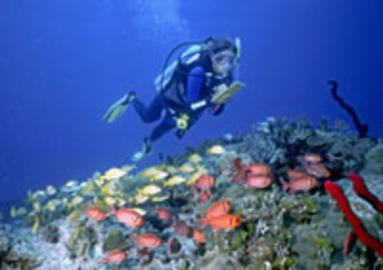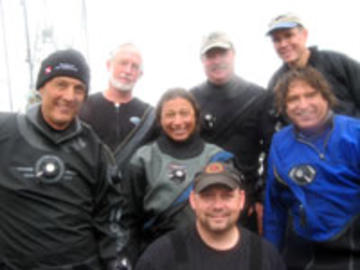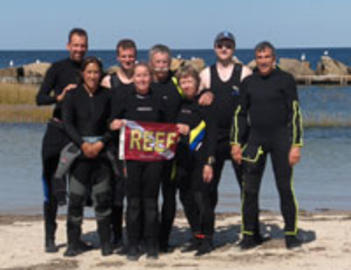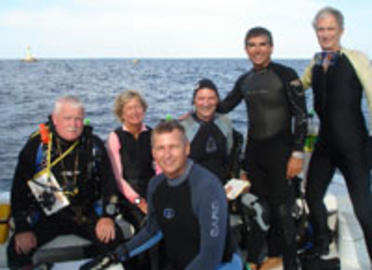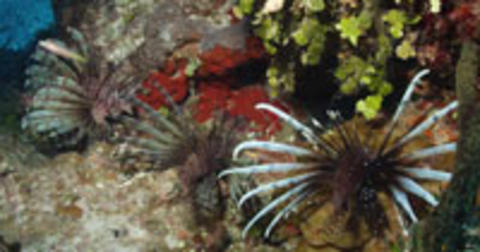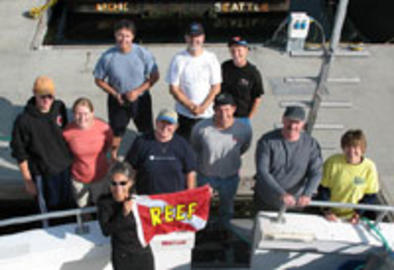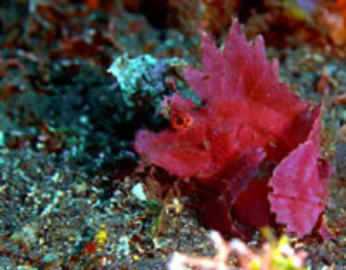Author: Leda A. Cunningham, Executive Director
REEF announces the release of the 2008 Field Survey schedule. Click here to see the flyer and read more information on these unique eco-expeditions, including contact information for each trip.
We kick off the season with a special expedition to Little Cayman Island January 20-27. Participants will join REEF Science Director Dr. Christy Semmens on the seventh consecutive year of studying reproductive behavior of the endangered Nassau grouper. Contact Southern Cross Club directly to sign up at (800) 899 CLUB (2582). This is a high-demand trip so please reserve your spot soon.
Field Surveys offer participants a fun and educational way to contribute to marine conservation. Led by expert underwater naturalists, scuba divers and snorkelers will learn to identify marine life and conduct fish population surveys that assist scientists in making informed resource management decisions. A unique combination of classroom presentations, group discussion and survey dives make Field Surveys the ideal choice for people just getting started with diving or "fish watching." We invite you to join a REEF Field Survey team of like-minded divers and snorkelers who want to make a difference for the future of our oceans. 2008 destinations include the Akumal, Mexico, St. Vincent, the Sea of Cortez, and many others-sign up today!
Author: Christy Pattengill-Semmens, REEF Director of Science
A team of Pacific REEF Advanced Assessment Team (AAT) divers recently conducted a week-long project conducting surveys of fish and invertebrate communities along the rugged outer coast of Washington. The Olympic Coast National Marine Sanctuary covers over 3,300 square miles of ocean off Washington State's rugged and rocky Olympic Peninsula coastline. Sanctuary waters host abundant marine life. A small but important stretch of coastline along the Strait of Juan de Fuca features some of the best diving in Washington State, but is rarely visited because of the remote location and limited diving facilities.
The team included 6 REEF AAT members and conducted 5 days of diving with Porthole Charters. The weather, which is always a wild card out there, fully cooperated and the team was able to visit all of our priority sites within the Sanctuary, most of which have been surveyed annually since 2002. A total of 72 surveys were conducted. To find out more about REEF's work in the OCNMS, visit http://www.reef.org/programs/sanctuaries/OCNMS .
Funding and support for this year's project was generously provided by Washington Scuba Alliance (WSA), an anonymous private foundation, the Winter's Summer Inn in Seiku, and the REEF survey participants. REEF encourages our Washington members to join WSA - it's free.
Author: Joe Cavanaugh, Director of Field Operations
REEF just completed our first bona fide New England Field Survey this past week. It was a big success and really ended up being a reconnoitering expedition to determine how REEF can better translate our Fish Survey Project to the Northeast where there are plenty of divers getting out in the water but very few who conduct surveys. There is also a seasonal effect for the northeast in that the fish all hibernate or leave when the water temperature drops to around 50 degrees Fahrenheit, leaving a 7 month fish surveying season in most areas (April-October). Shore diving is more the norm for many locations throughout New England and there are few commercial charter boats as you would find in the Caribbean, for instance. And dive clubs really are the main vehicle for divers to connect and coordinate temperate dives as well as arranging tropical dive trips for some winter relief.
Our REEF team was made up of 9 divers and we were based in historical Woods Hole on Cape Cod. We dived in Woods Hole, Dennis, and off of Cape Ann (our chilliest venue with bottom temps close to 50 degrees already. I co-lead this group with Holly Martel Bourbon, a marine fishery biologist and diving safety officer for the Commonwealth of Massachusetts. We were also joined by Sarah Taylor who is a New England Aquarium Aquarist II and collector. Together, Holly and I coordinated with a number of dive shops in the region and Maryhelen Shuman-Groh set up a REEF talk at the New England Aquarium Dive Club that meets every month at the aquarium and is where I got my start about 12 years ago. Incidentally, we surveyed a combined total of 19 fish species, no century dives in New England, let's just say you shoot for deca-dives (10 species) and this is why you won't find New England divers complaining on Caribbean dives, well, that and the fact that visibility beyond 10 feet is a blessing. We found a few wayward foureye and spotfin butterflyfish juveniles settled from the Gulf Stream. Next time we'll have to go to Rhode Island to help collect some of the tropicals.
New England diving is definitely unique and requires a special type of REEF capacity building to jumpstart the Fish Survey Project in the region. Bringing more dive shops into the fold such as Divers Market in Plymouth and Cape Ann Divers in Gloucester is a good first step in increasing REEF's efforts and the chance to engage the New England Aquarium Dive Club was especially important as this dive club reaches many of the naturalist divers in the region. I also attended a Boston Sea Rovers picnic (one of the oldest and most storied dive clubs in the U.S.) as Holly's guest and had the opportunity to speak with folks about REEF and our mission and hopes for increasing surveys in the region. Look for REEF to give a talk at the next Sea Rovers annual meeting in Boston http://www.bostonsearovers.com/ in March of 2008 and for us to give a REEF Citizens Science talk as part of the New England Aquarium's Lowell Lecture Series. We will also be partnering with the Aquarium as our newest Field Station http://neaq.org/. REEF and NEAQ will begin working on a number of training programs together to increase survey efforts in the northeast as well as having Aquarium divers become Advanced Assessment Team members and conduct surveys on their collection trips. There are many other opportunities for collaboration between NEAQ and REEF.
I would like to thank the REEF members who were all wonderful and patient on this trip as Holly and I had to kind of make things up as we went since this type of trip had not been done before, sort of a boat diving and shore diving mix, Bonaire meets New England without the yellow rocks. Thanks to Holly for co-leading the trip with me could not have done it without her) and to her boss, Vin Malkoski, for giving her the time to work with REEF and for the use of one of their vans for the week along with digital projector and many other shore diving supplies. Alison Johnson will be donating some underwater images from our dives for future curriculum/training along with Terrence Rioux, the dive safety officer for the Woods Hole Oceanographic Institute (WHOI). Holly and I plan on developing a more contemporary and appropriate curriculum that includes juvenile fish images and more inclusion of fish species that divers are likely to see on inshore dives. Lastly, I want to thank both Divers Market in Plymouth and Cape Ann Divers in Gloucester as well as the Marine Biological Laboratory for the use of their dive locker and their conference center at SWOPE.
Author: Leda A. Cunningham, Executive Director
Six volunteer divers from the REEF Advanced Assessment Team (AAT) surveyed two sites off the Aquarius Reef Base in Key Largo, Florida, to assist the National Marine Sanctuaries Program (NMSP) with the science component of the Aquarius 2007 Mission: If Reefs Could Talk. Aquarius, the world's only undersea laboratory, is part of NOAA's National Undersea Research Program (NURP) and sits seven miles off shore at Conch Reef. A valuable resource and good neighbor to REEF HQ, Aquarius hosts scientists from around the world, from sponge chemists to astronauts, in innovative research and education.
The team included REEF Special Projects Manager Lad Akins and AAT members Dave Grenda, Brian Hufford, Lillian Kenney, Wayne Manning, and Mike Phelan. Twelve fish surveys were conducted at each of two research sites near Aquarius using the Roving Diver Technique (RDT). This year's data will be compared to surveys collected during a 2001 mission to assess change in resident fish populations. The team also assisted NMSP in documenting the occurrence of long-spined sea urchin (Diadema) at each site. Once abundant on Florida Keys coral reefs, herbivorous Diadema play an important role in keeping coral-stifling algae from overtaking the reef structure.
Click here to read more about the 2007 mission and the Aquarius habitat, including daily broadcasts and interviews with the REEF survey team.
Author: Lad Akins, Special Projects
Working with leading scientists, REEF's lionfish field work is paying off in valuable information needed to address this key issue. Information from the five Bahamas projects conducted thus far this year is being used to help determine the range and extent of the lionfish invasion, as well as to address key questions on age/ growth, reproduction, genetics, parasites and habitat preference.
To date, more than 400 fish have been collected and shipped to the NOAA research lab in Beaufort NC and more than 500 sightings have been documented in the Bahamas. Data on length, plumage and stomach content have been gathered in the field, and samples for genetics and age/growth studies have been shipped to researchers. REEF has worked in close partnership with the College of the Bahamas, researchers at UNCW, and Salisbury University, and local dive operators Bruce Purdy and Stuart Cove in gathering and analyzing the data.
Interesting data to date include:
- Average size:188mm
- Most species: Pterois volitans (though there are some Pterois miles present also)
- Stomach content: about 70 % fish and 30 % crustacean with the most prevalent prey families including basslets, gobies and shrimp. Also found in stomachs: whole crab, whole sand diver, jawfish with eggs still in its mouth, and juvenile grouper (including Nassau)
- Genetics: It appears that there were at least 11 females involved in the original founding population. This number is up from previous indications of four fish.
- Reproduction: Fish are reproducing year-round with age at reproduction as young as 1-2 years.
- Habitat preference: Lionfish have been found in almost all habitat types including artificial sites, canals, deep reefs, shallow reefs, small ledges and sand bottom.
- Parasites: Compared to native fish, lionfish have almost no parasites, leaving more energy and time for growth and reproduction.
- Growth: Lionfish appear to grow faster than similar sized native fish species like the graysby and the red hind.
Author: Christy Pattengill-Semmens, REEF Director of Science
Thanks to a grant from The Russell Family Foundation, we are in the middle of a year-long initiative to actively engage new REEF surveyors in the region and to provide incentive to our existing surveyors to stay active and move up through the ranks of the REEF Experience Level system. We have teamed up with PNW REEF instructor, Janna Nichols, to coordinate a series of free training workshops throughout Washington and Oregon. These seminars will cover the Introductory REEF Fish Identification training, the REEF Pacific Northwest Invertebrate Identification training, and a NEW Advanced Fish Identification training program. Visit the Pacific Northwest Critter Watchers Webpage to see a complete list of classes. The project will also support a series of REEF survey day trips on area dive charters that will be open free of charge to current REEF surveyors who are actively conducting surveys and interested in advancing their REEF experience level. Ten active REEF surveyors recently participated in the first such opportunity - survey dives at two new REEF sites in the San Juan Islands, Washington earlier this month. In addition to conducting REEF surveys. The great news is that everyone on the trip who was eligible to move up one experience level did so! A big congratulations goes to Pete Naylor and Mary Jo Adamas, REEF's newest Pacific Advanced Assessment Team Level 5 members, and the rest of the gang who successfully passed the Level 2 or Level 3 exam.
We greatly appreciate the funding support of The Russell Family Foundation. This project will enable REEF to actively engage divers in marine conservation through support and enhancement of the REEF Volunteer Survey Project in the Pacific Northwest. Traditionally, divers and snorkelers have not received much more than a cursory introduction to underwater ecology or marine life identification. Even after years of experience in the water, most divers are able to identify only a handful of the marine life they see during their dives. REEF introduces marine enthusiasts to the incredible diversity of fishes and other wildlife found in local waters as well as the identification resources and survey methods needed to document these species. Active REEF surveyors advance through five experience levels (Novice: 1-3 and Expert: 4-5), based on the number of surveys completed and passing scores on comprehensive identification exams. While 536 volunteers have conducted surveys in the Pacific Northwest as part of the REEF Fish Survey Project, there are currently only twenty-eight members rated as Expert surveyors. However, expert level volunteers have conducted approximately one-third of all surveys submitted to date. It is clear that as volunteers improve their skills, they are more likely to stay actively involved in data collection.
Author: Kim Sovia-Crandon, Office Manager and Intern Coordinator
As we continue to showcase our valuable interns, I mentioned in last months newsletter that we would introduce our remaining fall intern. With that thought in mind please join REEF in welcoming Lauren Finan. Lauren is a student at the University of Colorado Boulder, pursuing her studies in Environmental Policy which is why she was such a good candidate for our program. She has a strong passion for the quality of our reefs and the ocean and diligently championed for our last remaining fall intern slot. An avid diver since age 14, she became interested in the quality of our delicate ecosystem, however, due to her locale in Boulder, she was totally landlocked and did not have the ability to get out and dive, and she will be doing plenty of that now, along with working her way through the various levels of our Fish Identification Course. Lauren role here at REEF will be the coordination of our presence at DEMA this year, as well as maintaining our membership data updates and working on the improvement of our educational/outreach program. We're fortunate that both our fall interns will be with us until December.
Author: Christy Pattengill-Semmens, REEF Director of Science
A few reminders to our surveyors:
- Always write your member number, your name, AND your email legibly on your survey form. It's not necessary to fill in the other contact information unless your information has changed or if you are a new member and do not yet have a REEF member number.
- Please fill in the full 8-digit Geographic Zone Code for the site where your survey was conducted. You can find a list of these hierarchical codes online [Click here]. If the site is currently not on our list, contact our Field Operations Coordinator, Joe Cavanaugh, to have a site code assigned (please provide as much information as possible, including as many digits as you can pinpoint for your location. A site code should never end in two zeros.
- The temperature fields on the survey form (Surface and Bottom) are both water temperature. Please do not report air temperature for the surface value.
- Remember to use a pencil, but do not to use the pencil that was underwater to fill out your scanform. The residual water can cause the paper to rip and it's almost impossible to erase.
- We graciously ask, moving forward, that team leaders handling a Field Trip survey, review the forms before your trip is over to make sure the participants have indeed filled all the necessary fields correctly, that also goes for current members that mail them in independently as well. Only send us your original form, not a copy and always use a pencil. NOW, to avoid all this, for non members, you can join REEF online, this way you fill out the information we need, thus eliminating the mind reading on our end.
- And finally - for surveyors in the Tropical Western Atlantic (TWA) or Northeast (NE) regions, please consider using our online data entry interface. This will save you time and postage as well as grant you the eternal gratitude of our small staff. Your surveys will also be processed quicker, and it's better for the environment!
Author: REEF Staff
Here's what we're up to in the coming months:
October 31- November 3: DEMA Show in Orlando, FL. Come visit us at both 1133 and you could win a signed print by Tom Isgar by partaking in our DEMA raffle to help raise funds for REEF.
November 11-17: Conservation Week with Stuart Cove's Dive Bahamas in Nassau with Ned and Anna DeLoach, Bruce Purdy and Andy Dehart
Recent additions to the previously planned Eco-week at Stuart Coves Dive Bahamas in Nassau will be highlighted by Ned and Anna DeLoach, who will be presenting their famous behavior talks as part of the week's activities. In addition, Andy Dehart, general Manager of the National Aquarium in Washington DC and Bruce Purdy, Bahamas dive operator and conservationist will talk about Bahamian conservation issues and marine protected areas. As previously planned, Lad Akins will lead the project and discuss lionfish issues as they relate to other environmental factors such as artificial reefs. Stuart Cove will host the project and discuss shark and local conservation issues.
December 8-14: Blackbeard's Cruises is announcing a new lionfish project focusing on Grand Bahama.
For more information, on these projects, view the pdf here...
Author: REEF Staff
Here are a few notes and news bits we'd like you to know about:
- Field Survey Update (2007-2008): Thanks to all who have made our 2007 Field Survey year a successful year with just a few trips left!
- Going on a trip? Order Scan forms, underwater survey paper, books, and other items at the REEF online store

